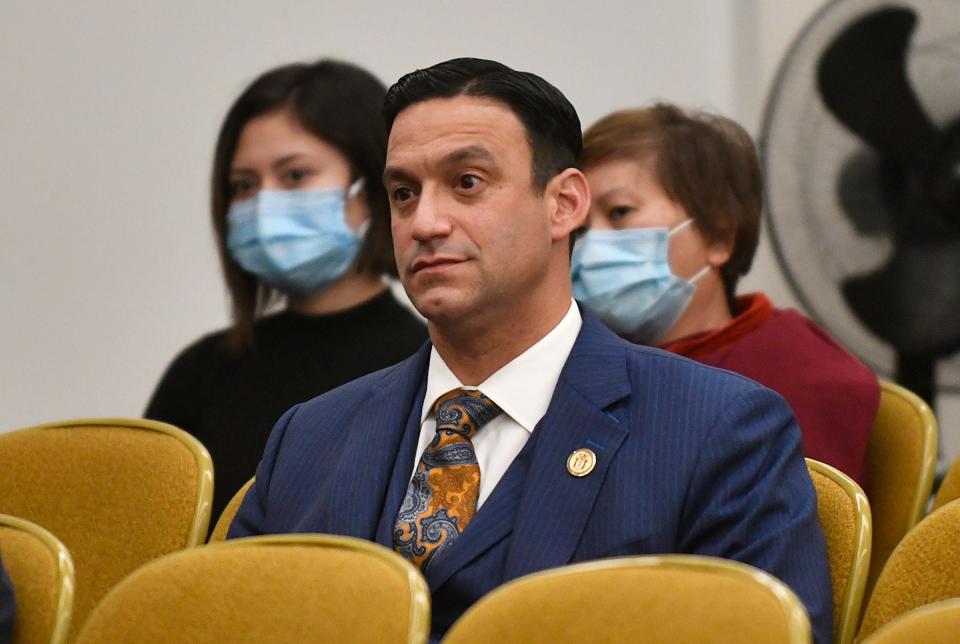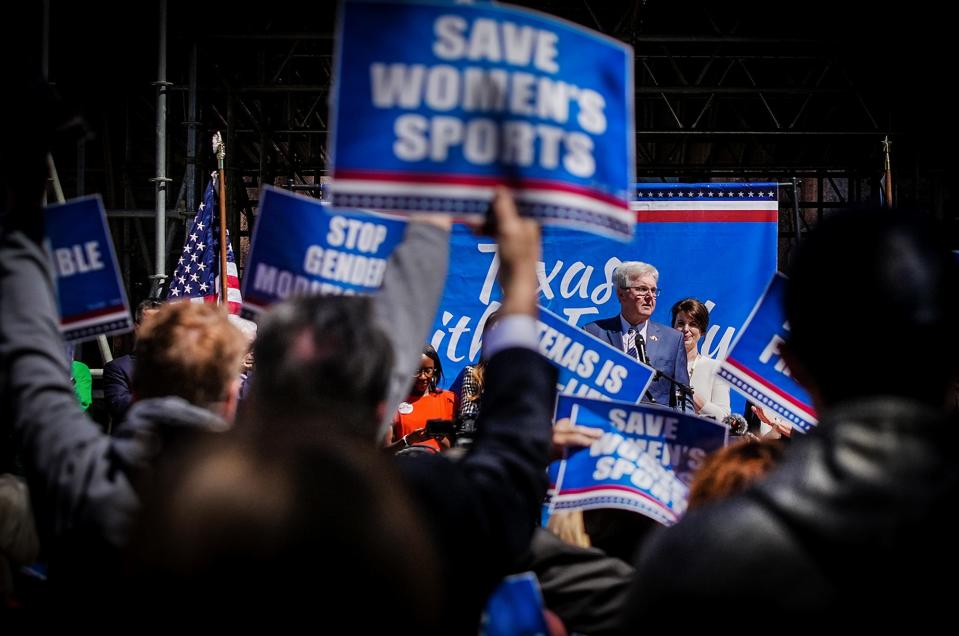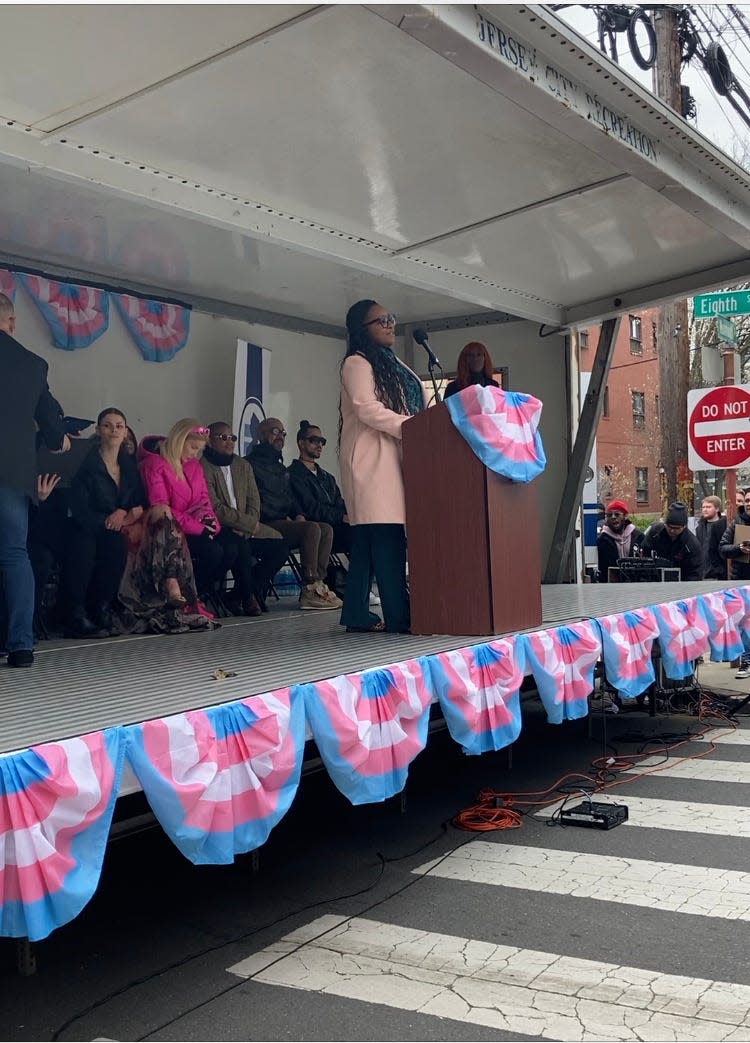NJ changes to school equity code won't affect trans youth in sports, group says
The organization that runs high school sports championships in New Jersey says the state's revisions to policy on transgender students' rights in schools will not affect its rules on how trans students participate in sports.
The New Jersey State Interscholastic Athletic Association said its rules have been in place since 2009, and that the state's recent actions are not giving trans students, or any other group, an advantage.
That contradicts mounting accusations by a chorus of Republican politicians. They say that by permitting gender identity instead of sex assigned at birth to be the basis of how schools select sports teams, the Murphy administration is not protecting the rights of girls, who might be competing against boys who identify as female in high school athletics.
Many Republicans and conservative voters roundly lambasted the State Board of Education, the nonpartisan, governor-appointed body that approves rule-making on state education policy, for its revisions this month to Chapter 7, "Managing for Equity in Education," made as part of a seven-year review process.
Trenton's two top-ranking Democrats, Assembly Speaker Craig Coughlin, D-Middlesex, and Senate President Nick Scutari, D-Union, have also joined the outcry.

But the NJSIAA says nothing material has changed in high school sports and that despite the debate about trans youths in sports, not one participating school out of its approximately 440 members has protested or appealed a trans student's membership on a team since 2009.
"The association does not track transgender student athletes, but we are aware that transgender students have participated in high school athletics in New Jersey," the organization told NorthJersey.com. "We can confirm that to date no member school has appealed the eligibility of a transgender student." Regardless of the state's changes, the association is already in compliance with state policy, it said.
'Both' sexes to 'all' sexes
What triggered the Republican outcry is the Murphy administration's changes to the language in the equity in education policies. The language is designed to guide K-12 policy broadly. The new language replaces "both" sexes with "all" sexes and changes references to gender from a traditional and biological binary of males and females. It's a sticking point with conservatives.
Changes include replacing the word "equality" with "equity" throughout, and removing gendered pronouns and nouns.
More: Equality vs. equity: Top NJ Dems join criticism over fairness policy for public schools
"'Equality' means sameness, uniformity, and equivalence, and focuses on a student's access to educational resources,” the state said in its summary of the changes. “Equity” takes into consideration each student’s different needs and, by not assuming sameness, offers a fairer approach, the state said.
The actual changed language in Chapter 7 does not mandate procedures for how schools should pick teams, and it notes that competition should be fair. It replaces “two” sexes with “all” sexes, when schools operate separate teams, “as long as the athletic program, as a whole, provides equal opportunities" for students to participate in "sports at comparable levels of difficulty and competency.”
The revised language does not change how students will compete, whether transgender or not, says the NJSIAA. Schools are responsible for selecting sports teams, but they can appeal or challenge situations that "would adversely affect competition or safety," according to NJSIAA policy. And that has never happened, said a spokesperson for the organization.
Snuffing out dissent
State Sen. Michael Testa, R-Cumberland, said that's not a sign of a policy that is working well. He said that if no one has protested or appealed the NJSIAA policy until now, it is a sign of "snuffing out" dissent. There could be a chilling effect on victims of unfair transgender policies, Testa said, adding, "Why should we wait until someone complains?"
Trans youths have to declare their identity to participate in a team that matches their gender expression, and they can play sports on the team they identify with or on a team that matches their gender assigned at birth, but not both, according to NJSIAA policies.

"This is not about bigotry," Testa said. "We should be making sure that no biological female is prevented from achieving her dreams ... due to the fact that she had to compete and lose against a biological male. We should be preventing the harm, not waiting for the harm to occur. We should be proactive, not reactive."
Testa's 2021 bill, the "Fairness in Women's Sports Act," has languished in the state Senate. It proposes that school sports teams operate on the basis of biological sex, because of the hormonal and physiological differences between the two sexes.
"I would love for this policy’s critics or opponents to identify a transgender girl playing high school sports in the state of New Jersey that has gotten a competitive advantage," said Robyn Gigl, a transgender advocate and attorney who has consulted groups on policy around trans issues, including the NJSIAA.
"I don’t think they will be able to do it," Gigl said. "The policy has been in place for 14 years and nobody has had a problem. This is a solution in search of a problem."
Critics like Testa are wrong to say the State Board of Education recommended anything other than the use of non-gender terminology, she said.
"We're losing sight of the fact of what athletics are supposed to be about at the youth level," Gigl said. "I'm not talking about professionals or even college. I'm talking about high school and youth sports. They're supposed to be about being on a team and participating. And growing as an individual. And somehow this is being corrupted."
The state's changes to gender language on K-12 equity policies comply with New Jersey's Law Against Discrimination, the Department of Education said, in its written responses to public comments on the policy.
“It’s shocking to hear that anyone would want to prevent transgender children from participating as who they are in school sports," said Jeanne LoCicero, legal director at the American Civil Liberties Union of New Jersey, which advocates in law and policy for individual liberties and rights for various groups, including trans people.
"Every student has a right to be themselves in school, and to have their identity respected," LoCicero said in a statement. Targeting gender identity is "cruel, cynical and discriminatory.”
Teens more likely than adults to identify as trans
A 2022 UCLA study found that teens between ages 13 and 17 were more likely than adults to identify as transgender, and the number of youths who identify as trans has doubled since 2017. But the actual numbers are still small — less than 1% of teens in New Jersey and 1.4% nationwide identify as trans.

Testa implied that letting trans youths participate in sports limits girls' chances to win college athletic scholarships and compete on the national level. Last August, the NCAA adopted changes to its policies on a sport-by-sport basis for trans youth, aligning them to international and Olympics guidelines. "When it comes to scholarships for college, the NCAA has requirements for different sports, including for trans female athletes," Gigl said.
There's no evidence that any trans female has gotten an unfair advantage in the state of New Jersey, she said.

And it is misogynistic, Gigl said, to assume "that all people who are assigned male at birth are better athletes than all people who are assigned female at birth."
"There are some pretty amazing female athletes who would run rings back around people who were assigned male at birth," she said.
The current policies go against the grain of Title IX, which prohibits discrimination on the basis of sex, Testa said. But the discussion around Title IX has evolved in the decades since it was first passed in 1972 to protect women's rights in educational institutions and programs that receive federal funds.
Biden framework for eligibility criteria
The Biden administration proposed a draft rule in April that would prohibit blanket bans on transgender youth participation in sports, but would also give schools and colleges the flexibility to limit transgender students' participation in certain sports.
"The rule would provide schools with a framework for developing eligibility criteria that protects students from being denied equal athletic opportunity, while giving schools the flexibility to develop their own participation policies," the federal government said, saying it was responding to uncertainty around how to craft these policies as institutions embrace more inclusive views on gender and gender identity.
This article originally appeared on NorthJersey.com: NJ change to school code won't affect trans kids in sports, group says

